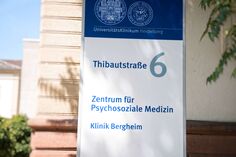Section for Experimental Psychopathology and Neuroimaging
Welcome to the website of the Section for Experimental Psychopathology and Neuroimaging!
The Section for Experimental Psychopathology and Neuroimaging has been established in 2016 as a research- and clinical section at the Center for Psychosocial Medicine at Heidelberg University Hospital.
The major goal of this section is the improvement of differential diagnosis and therapy for treating affective (depression, mania) and schizophrenic disorders by developing personalized medicine approaches in psychiatry. Our research is based on more than 20 years of experience in development and application of most advanced methods in functional neuroimaging. In this field of research, which is clinically highly relevant, the section is internationally very renowned and has published in the most high-ranking scientific journals (for example Nature, Science, Lancet, Nature Neuroscience). The section is collaborating with excellent national and international research partners and raised many third-party fundings by renowned institutions such as the EU, the Federal Ministry of Education and Research (BMBF) and the German Research Foundation (DFG).
Please find more information about our research and the diagnostic and therapeutic services we offer for patients with mental disorders on the following pages.
The Day-Care Clinic for Precision Psychiatry and Affective Disorders (Day-Care Clinic Kraepelin)
The Day-Care Clinic Kraepelin focusses on the treatment of patients suffering from monopolar (only depression) or bipolar affective disorders (manic-depressive disorder). In addition to guideline-oriented diagnostics and treatment, we offer a precision diagnosis of pathophysiological changes of brain function which will be taken into consideration for individualized treatment selection.
The Special Outpatient Clinic for Personalized Psychiatry (S4P)
The Special Outpatient Clinic for Personalized Psychiatry (S4P) is a research institution giving outpatients with affective (depressive and bipolar), schizoaffective and schizophrenic disorders the opportunity to also obtain a precision diagnosis of pathophysiological changes of brain function.




